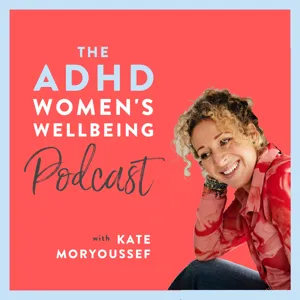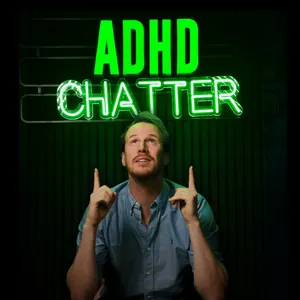Podcast Summary
Expert Insights on Emotional Regulation for ADHD Women: Experts share valuable techniques to help improve emotional regulation, build resilience, minimize reactivity, and understand emotional experiences for women with ADHD.
Emotional regulation is a crucial aspect of managing ADHD, and it can be particularly challenging. Kate Moore, the host of the ADHD Women's Well-being Podcast, recognizes this need and has created a private podcast series called Karma Days to help women find calmer, more controlled emotional responses. In this episode, she brings together experts on emotional regulation, including Lydia Zalowski on compassionate communication, Marion Saunders on morning routines, Tamara Rezia on acceptance, Melissa Orlov on intense emotional moments, Marcy Cardwell on dealing with emotional derailment, and Grace Timothy on editing life demands. These experts offer valuable insights and techniques to help listeners build resilience, minimize reactivity, and understand their emotional experiences. If you're looking to improve emotional regulation as part of your ADHD journey, consider checking out Karma Days and this insightful episode.
Improve relationships and self-regulation with mindfulness and compassionate communication: Practicing mindfulness and compassionate communication can lead to healthier relationships and personal growth by improving self-regulation, effective problem-solving, and compassionate responses.
Understanding the present moment and practicing mindful communication can significantly improve our relationships and self-regulation, particularly for individuals with ADHD. Mindfulness acts as a self-regulation skill by allowing us to acknowledge and manage our emotions and reactions, leading to more effective and compassionate communication. Nonviolent or compassionate communication, as advocated by Marshall Rosenberg, emphasizes non-judgmental problem-statement and expressing feelings rather than blame or reactive responses. By focusing on these techniques, we can create a more open and understanding dialogue, ultimately leading to healthier relationships and personal growth. Remember, the key is to be present and mindful in our communications.
Mindful communication involves connecting with values and expressing feelings compassionately: Express feelings in a compassionate way, make requests instead of reacting with anger, and focus on the impact of actions to foster heartful communication and improve relationships
Effective communication in mindfulness involves connecting with values and expressing feelings in a compassionate and non-judgmental way. Instead of reacting with anger or blame, make requests and focus on the impact of actions on yourself. For instance, a mother dealing with a messy teenager might say, "I feel anxious and stressed when things are cluttered. Could you help me out by picking up your things?" This approach sets up a conversation that is less defensive and more likely to lead to understanding and cooperation. By practicing self-awareness and vulnerability, we can foster heartful communication that improves relationships and overall well-being.
Self-compassion is essential for individuals with ADHD: Practicing self-compassion helps alleviate feelings of failure and low self-esteem in individuals with ADHD. Mindfulness practices can increase self-awareness and model calm behavior for children.
Practicing self-compassion is crucial for individuals with ADHD, especially in dealing with the inner critic and self-judgment. Approaching oneself with compassion and forgiveness can help alleviate feelings of failure and low self-esteem. Mindfulness practices, such as deep breathing and body awareness, can help adults become more self-aware and respond thoughtfully in moments of stress, setting an example for children. By taking a few minutes each morning to check-in with oneself and set intentions, adults can model calm and graceful behavior for their children, breaking the cycle of chaos and anger in the household.
Managing Daily Transitions with ADHD: Preparation and Self-Awareness: Recognize and address feelings in the body to prevent reactive responses. Use EFT and breath work for self-regulation. Model self-care and emotional regulation for children. Understand the role of the prefrontal cortex in managing executive functions and support it accordingly.
Managing the daily transitions in life, especially for those with ADHD and children with ADHD, requires intentional preparation and self-awareness. The speaker emphasizes the importance of recognizing and addressing feelings in the body to prevent a reactive response. She shares her personal experience of using EFT (Emotional Freedom Technique) and breath work to regulate her nervous system and set a calm tone for the day. The speaker also encourages modeling self-care and emotional regulation for children, who will one day become adults and parents themselves. Additionally, the concept of the "prefrontal cortex butler" was introduced as a helpful analogy for understanding the role of the prefrontal cortex in managing executive functions and the importance of giving it the necessary support.
Imaginary butler for focus and emotions: People with ADHD can benefit from visualizing an imaginary figure for focus and emotional support. Practice good time management, set boundaries, and prioritize self-care to live a balanced life.
People with ADHD can benefit from visualizing a "butler" or supportive figure in their mind to help manage their attention and emotions. This imaginary figure can serve as a calming voice that directs focus and provides gentle reminders, acting as a helpful assistant. However, it's important to remember that this concept is not based on reality, as neither the speaker nor the child in the story have a butler. Additionally, people with ADHD may also experience internal "angry neighbors" that try to control their behavior through negative emotions. To live a balanced life, it's crucial to practice good time management, set boundaries, and remember that tasks take time. It's essential to avoid overextending oneself and prioritize self-care to prevent chronic stress and potential health issues. Overall, the conversation emphasizes the importance of self-awareness and acceptance of the unique challenges that come with having ADHD.
Understanding and managing challenges in relationships with ADHD: Acceptance, empathy, and self-compassion are crucial for individuals and couples dealing with ADHD. Misunderstandings and negative reactions can lead to struggles, while understanding symptoms and responding effectively can strengthen the bond.
Living with ADHD comes with unique challenges that can impact relationships, and it's essential for both partners to understand and manage these challenges. ADHD can feel like a superpower with limited usage, leaving individuals exhausted. Acceptance and acknowledgement of the condition are crucial for individuals and couples to navigate the situation effectively. Misunderstanding and reacting negatively can lead to struggles, while responding with empathy and understanding can lead to a more harmonious relationship. It's also essential to grieve past misunderstandings and lost time, and to practice self-compassion, as individuals with ADHD will still experience tendencies despite awareness and efforts to manage the condition. Additionally, understanding common ADHD symptoms, such as rejection sensitivity dysphoria, can help partners respond more effectively and build a stronger bond.
Breaking the cycles of struggles in families with ADHD: Individuals with late-diagnosed ADHD can prioritize emotional management to improve relationships, prevent addiction and emotional dysregulation, and accommodate partners' unique challenges.
For individuals with ADHD who receive a diagnosis later in life and discover it's hereditary, they have an opportunity to break the patterns and cycles of struggles in their families. The ADHD brain is highly reward-focused and emotional, which can lead to addiction issues, compulsive disorders, and emotional dysregulation. This emotional dysregulation can result in intense and quick feelings, avoidance of partners, and a quick move to rage, making it crucial for individuals with ADHD to prioritize emotional management. Partners without ADHD may end up walking on eggshells and not getting their needs met in the relationship. Emotional management can be achieved through therapy, mindfulness practices, exercise, and setting up verbal cues. Marcy Caldwell shares an example of how her husband's sensitivity to her dog's bark is an issue, emphasizing the importance of understanding and accommodating each other's unique challenges in the relationship.
Managing Emotional Dysregulation: Identifying Sources and Coping Strategies: Identify sources of overstimulation, address them with effective coping strategies like earplugs, blue light glasses, mindfulness techniques, and creating buffers in schedule. Acknowledge and address sources of emotional dysregulation to improve overall well-being.
Managing emotional dysregulation, whether it's due to ADHD or other causes, involves identifying and addressing sources of overstimulation and practicing effective coping strategies. The speaker shared her experience with a barking dog and how they've found ways to minimize the dog's reaction when they come home. This includes having one person enter the house first, so the dog can bark and exhaust its energy before the other family member comes in. The speaker also discussed the importance of managing daily stressors and creating buffers in one's schedule to prevent emotional dysregulation. She shared her own experience of trying to juggle work and family responsibilities and how the lack of a buffer period can lead to emotional overwhelm and reactivity. Effective coping strategies can include muffling external noises or sensations with tools like earplugs or blue light glasses, as well as practicing mindfulness techniques like breathing exercises or taking a short walk. The key is to acknowledge and address sources of overstimulation rather than ignoring them and trying to power through. By taking a proactive approach to managing emotional dysregulation, individuals can improve their overall well-being and create a more peaceful and productive home environment.
Managing ADHD as a mother: Self-care, awareness, and support: Mothers with ADHD need intentional self-care, awareness of personal limits, and support to manage symptoms effectively. Coping mechanisms include masking and seeking help, while being mindful of personal privileges and hormonal changes is crucial for long-term management.
Managing ADHD, especially for mothers, requires intentional self-care and creating buffers between activities to avoid overwhelming emotions and potential explosions. It's essential to recognize the importance of prioritizing self-care, even in the comfort of our homes, and being aware of personal limits and needs. Masking or adapting to demanding situations can be effective coping mechanisms, but it's crucial to seek support from family, partners, and work environments when possible. Being mindful of personal privileges and the potential impact of hormonal changes is also essential for long-term management. Overall, awareness, self-care, and support are key to successfully managing ADHD and its comorbidities.
Balancing ambition and self-care: Recognize guilt, find balance, prioritize well-being, adjust work schedule or lifestyle, and practice self-compassion.
It's important to recognize and address the guilt that comes with having privileges and achieving success, while also acknowledging the limitations that can hinder our potential. As we age, we become more aware of what's good for us, but sometimes we can be too cautious and limit ourselves. It's crucial to find a balance between ambition and self-care, and not judge ourselves for making choices that prioritize our energy and well-being. This may involve making adjustments to our work schedule or lifestyle, and reframing our mindset to allow for flexibility and self-compassion. It's a continuous process of tinkering and rebalancing throughout different stages of life, and it's essential to remember that knowledge and awareness are powerful tools, especially for those with ADHD. So, take small steps towards making changes that enhance your daily life, and consider sharing this episode with others who may benefit from the conversation. Remember, it's okay to strive for success while also prioritizing your well-being.




